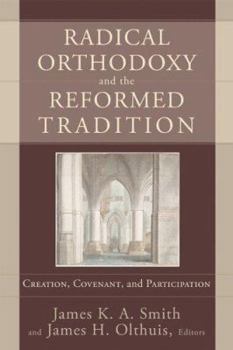Radical Orthodoxy and the Reformed Tradition: Creation, Covenant, and Participation
Compares the differences and points of intersection between the growing Radical Orthodoxy (RO) movement and the Reformed tradition. This book deals with topics being debated in theological and philosophical circles, including the material world's participation in transcendence, aesthetics, politics, covenant, and cultural theory.
Format:Paperback
Language:English
ISBN:080102756X
ISBN13:9780801027567
Release Date:November 2005
Publisher:Baker Academic
Length:301 Pages
Weight:2.85 lbs.
Dimensions:0.8" x 6.5" x 8.8"
Customer Reviews
1 rating
Reformed Interaction with a New Augustinianism
Published by Thriftbooks.com User , 16 years ago
This is the second attempt by Reformed writers to interact with a movement that appears to have little to do with Reformed theology, is absent from current Reformed discussions, and whose high level of academic erudition will be lost on the average reader in the Reformed pew. Still, Radical Orthodoxy (RO) represents a left-wing, Anglo-Catholic response to modernity and secularism. One more point to mention: this book is purported to be a "reformed" response to Radical orthodoxy. This needs to be qualified a bit. The authors, while confessionally calvinistic, represent the Dutch neo-calvinist vision (with whom I have much sympathy and respect). While that is a powerful strand within calvinism, it does not represent all of Calvinism. Many Southern Presbyterians will cringe at them. James K. A. Smith begins the foray by summarizing RO's thought and pointing out key differences between RO and the Reformed Tradition (RT). RO holds to a platonic ontology whereby men relate to God via participation. Michael Horton will later respond that "covenant" is a better category than "participation." RO holds that Calvinism stems from modernity in that it appropriates a Scotist ontology that flattens reality (there might be more truth in this than we would comfortably admit--JA). This translates into a stale Eucharistic theology whereby Christ is absent. Laura Smit gives a good, rich response by means of articulating a truly Calvinian sacramentology. RO rightly wants to see theology take the place as champion among all disciplines. It sees a unified faith that speaks to all areas of life and rightly resists all unbiblical dualisms. Unfortunately, it ends up sounding like socialist rhetoric baptized in Christian categories. At the end I will point out where I think the Reformed writers are correct and where I think RO is correct. I will focus on a few essays from the book. John Milbank, while firmly disagreeing with Reformed theology, helpfully outlines RO's vision: a vision of an alternative Protestantism. Milbank insists we need an alternative Protestantism because the 16thC Reformation, necessary as it was, was the birth-child of modernity and couldn't escape modernity's embryonic secular presuppositions. Fortunately, RO maintains a way for the church to truly be the Church, being obedient to Scripture, while avoiding the necessary secularism of modernity. Milbank did a wonderful job, building upon the work of Jean Luc Marion in describing "enfolded layers of being." Interestingly, Milbank gives a good defense on why there still might be fairies in the world. I was convinced. Michael Horton has the best essay in the book, "Covenant and Participation." Horton appreciatively follows the RO critique of Enlightenment epistemology. He then uses Kant and the postmodernists to set the stage for a failure of all non-biblical epistemologies. Horton shows that God meets us as a stranger. He meets us in Word and in Sacrament (e.g., the Emma






